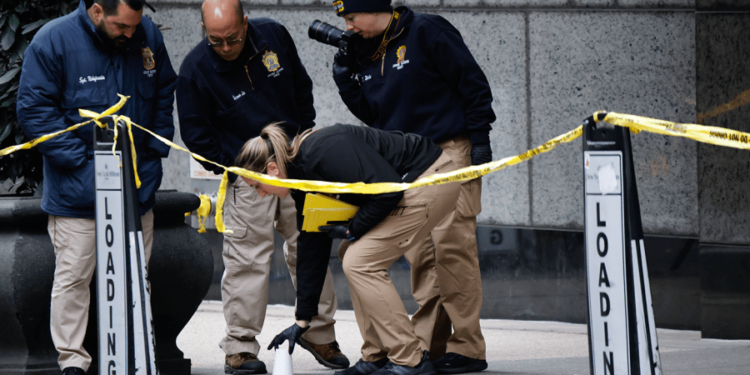
The shocking murder of UnitedHealthcare CEO Brian Thompson on a Manhattan street corner last week suggests an unsettling truth about American healthcare: Our system hasn’t just failed — it has lost its moral legitimacy entirely.
The chilling messages inscribed on the shell casings, “deny,” “defend” and “depose”, read like an indictment of our entire healthcare apparatus.
What’s even more disturbing is the public response. Across social media, many are not expressing horror at this act of violence but instead sharing stories of insurance denials and celebrating corporate comeuppance.
“Sending prior authorization, denied claims, collections & prayers to his family,” wrote one commenter. “Thoughts and prayers are out of network,” quipped another.
When citizens respond to murder with dark humor rather than revulsion, we must ask: How did we reach this point?
The answer lies in the industrialization of human suffering. UnitedHealthcare, with its $281 billion in revenue and responsibility for covering the lives of 49 million Americans, recently deployed an AI system to deny elderly patients’ claims with a staggering 90 percent error rate.
The company continued using this system despite knowing it was wrong nine times out of ten, banking on the fact that most patients wouldn’t have the resources to appeal. This isn’t health care — it’s algorithmic cruelty masquerading as efficiency.
Adding a layer of dark irony to this tragedy, Thompson was rushed to Mount Sinai Hospital, a healthcare system that UnitedHealth had dropped from its network just months earlier, forcing thousands of patients to find new providers or pay astronomical out-of-network costs. While we are still learning more about the shooter and his motivations, it appears the Byzantine system Thompson helped architect ultimately shaped his own final chapter.
Even UnitedHealthcare’s own employees recognize the systemic failure. As one worker noted after Thompson’s death: “I wasn’t aware many people hate him. But I saw lots of denied claims that should be covered everyday.” This casual admission reveals how normalized the denial of claims has become within the industry.
The numbers tell a devastating story: 500,000 Americans declare bankruptcy every year due to medical bills. Nearly half skip needed medical care due to costs — the highest rate ever recorded. We have created a system where artificial intelligence makes life-or-death decisions while families deplete their savings to keep loved ones alive for services that should be covered by the insurance that they pay increasing amounts for.
This is a moral catastrophe. When insurance executives are gunned down in broad daylight and the public response is cynical schadenfreude, we’re witnessing the complete collapse of trust in our health care institutions. As one TikTok commenter ominously noted, “This is the only way they’ll listen.”
Violence is never the answer, but we must understand why people have lost faith in traditional channels for change. When insurance companies deploy algorithms to deny care, they send a clear message that profits matter more than patients. The public has received this message loud and clear. When prominent politicians on both the right and the left agree that something’s rotten in the state of health care, you know we’ve reached a tipping point.
The path forward requires more than incremental reform. We need a fundamental reimagining of healthcare delivery in America. For health insurance, this may mean banning algorithmic care denials, implementing genuine transparency in coverage decisions, and creating real accountability for wrongful denials. For the healthcare system overall, transparency in pricing, reduction of administrative overhead, and a renewed focus on preventive care could help alleviate some of the cost burdens. Most importantly, we need to restore the basic premise that health care should prioritize healing.
The alternative is a continued erosion of trust and legitimacy that threatens the very foundation of our healthcare system. A staggering 75 percent of patients view the healthcare system as broken. When people feel the system is rigged against them, when they believe their insurance company is their enemy rather than their advocate, we risk the complete breakdown of the social contract that makes healthcare possible.
Thompson’s tragic death should serve as a wake-up call. Not just about security or public safety, but about the desperate need to rebuild trust in American healthcare. Because in a functioning system, we wouldn’t need algorithms to deny care — and citizens wouldn’t respond to violence with bitter jokes about insurance claims.
The choice is clear: Reform the system now, or watch as public trust continues to erode, taking with it any hope of preserving the institutional legitimacy necessary for healthcare to function in a civil society.
Neal K. Shah is the CEO of CareYaya Health Technologies, one of LinkedIn’s 2024 Top 50 Startups in America. He runs an AI-powered technology platform that connects thousands of families with elder care across America.
Copyright 2024 Nexstar Media Inc. All rights reserved. This material may not be published, broadcast, rewritten, or redistributed.






